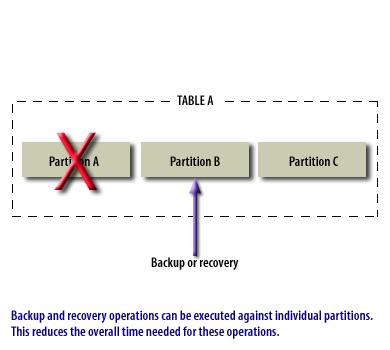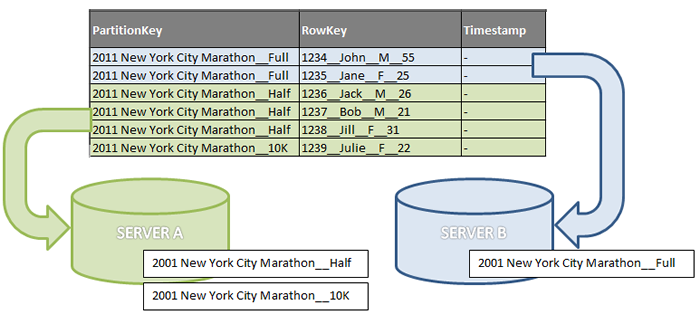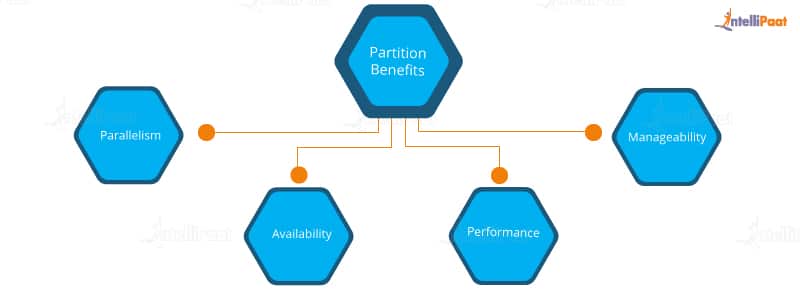Database Partitioning Benefits
Moreover partitioning can greatly simplify common administration tasks. Advantages of Database Partitioning Tables in Oracle Table partitioning delivers advantages in three main areas performance maintenance and availability.

Database Table Partitioning Advantages Oracle
Increased performance - during scan operations the MySQL optimizer knows what partitions contain the data that will satisfy a particular query and will access only those necessary partitions during query execution.

Database partitioning benefits. Performance advantages A table is partitioned based on a criterion such as the value for a particular column. Is easy as to implement as it requires no changes to applications and queries. Decreases costs by storing data in the most appropriate manner.
The size of the table has grown huge. Ease of purging old data If you need to clear down records more than say 6 months old you can partition the table on the date and then swap out older partitions. Analysis of Partitioning Benefits There are two candidate schemes for partitioning this table.
Improves availability through individual partition manageability. You have a data warehouse that includes large tables. Advantages of using table partitioning DBA to DBA Advantages of using table partitioning Easy roll-in and roll-out of data Easier administration of large tables Flexible index placement Faster query processing Easy roll-in and roll-out of data.
As a rule of thumb the size of the table should exceed the database servers physical memory. See details here You. If any of the following circumstances apply to you and your organization consider the numerous benefits of table partitioning.
Partitioning a hard drive while a valid way to really improve the flexibility and mobility in terms of what you can do with your computer is not without its pros and cons. Ill also explain my methodology for identifying tables for partitioning. Active Oldest Votes 3 It can help query performance by employing partition elimination.
Table partitioning is best way to improve database performance with large databasesIf your table contain millions of records then this is highly recommended you should use partitioningIn this article I will explain what is partitioning and how can implement partitioning with database. What is a database table partitioning. When you partition your table the Oracle database optimizer can.
200 million rows is certainly in the range where you could benefit from table partitioning. The precise point that ensures benefits from partitioning depends on the application design. Partitioning is the database process where very large tables are divided into multiple smaller parts.
Partitioning also enables database designers and administrators to solve. This article describe pros and cons of partitioning in SQL Server. It can also provide a mechanism for dividing data by usage pattern.
Intrusive as application needs changes to write to the correct partition. It is popular in distributed database management systems where each partition may be spread over multiple nodes with users at the node performing local transactions on the partition. Smaller tables smaller indexes lower query latency.
Increases performance by only working on the data that is relevant. General strategies to take partitioning decision are as follows. Index alignment needs to be looked into when partitioning.
You have a data warehouse that would benefit from easier roll-in and roll-out of table data. Benefits The main goal of partitioning is to break up data in a way that improves performance. There are a number of benefits that come with partitioning but the two main advantages are.
By splitting a large table into smaller individual tables queries that access only a fraction of the data can run faster because there is less data to scan. So its important to know all of them before engaging in a hard drive partitioning sequence. This post will focus on the benefits restrictions and performance of partitioning projections.
PROS Manageability Fast Data Deletion and Data Load Piecemeal backup restore of historical data Partition-wise index management Minimize index fragmentation for historically-partitioned tables Support alternative storage for historical data. Check if the table can be defragmented. This means large sections of big tables can be ignored when looking for values which means much less IO.
When to Partition a table. There are two main benefits for partitioning our tables. Depending on your application you could bet some of the benefits listed below.
It is not unusual for partitioning to greatly improve the performance of certain queries or maintenance operations. For example you can archive older data in cheaper data storage. All databases offer commands to do this MySQL calls it OPTIMIZE PostgreSQL calls it VACUUM Check if you can add memory to server RAM is cheap.
Database partitioning is normally done for manageability performance or availability reasons or for load balancing. First and foremost theres a big performance benefit. A partition is a division of a logical database or its constituent elements into distinct independent parts.
List Of Pros Of Partitioning a Hard Drive. The results of this partitioning scheme for this table and. A comprehensive guide on working with table partitions is available in the documentation.
The first partitioning scheme is to partition the rows by call_start probably defining one partition for each day. Partitioning can improve scalability reduce contention and optimize performance. However the partitioning strategy must be chosen carefully to maximize the benefits while minimizing adverse effects.

Deep Into Partitioning Databases All About How Data Is Partitioned In By Shilpi Gupta Towards Data Science

Database Partitioning Techniques Intellipaat Blog

Why Csr The Benefits Of Corporate Social Responsibility Will Move You To Ac Corporate Social Responsibility Social Responsibility Social Responsibility Quotes
Posting Komentar untuk "Database Partitioning Benefits"